- Author Jason Gerald gerald@how-what-advice.com.
- Public 2023-12-16 10:50.
- Last modified 2025-01-23 12:04.
Apparently, solitude has many benefits. By being alone, you can rest your mind and body, think about problems effectively, and find solutions to problems you didn't think of before. Some people don't really like socializing, and prefer activities that can be done alone. If you're an introvert, being a loner isn't as damaging. However, low levels of socialization can be a symptom of depression and other mental illnesses. Make sure you pay attention to your mood when you're alone, and seek professional help if you're feeling depressed.
Step
Method 1 of 3: Spending Time Alone
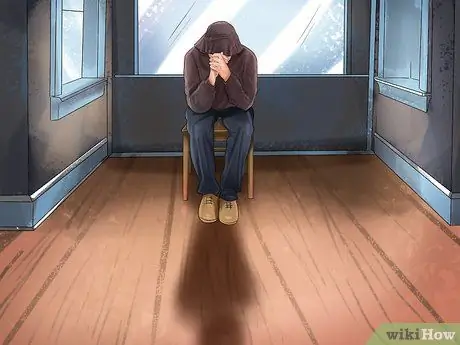
Step 1. Be prepared to face fear
Some people are afraid of spending time alone. In this modern age, our lives are very connected to each other. If you want to be alone, you may need to take some time to adjust, because the first time you're alone, you may feel scared or confused.
- Try to ignore negative thoughts when you start spending time alone. Remind yourself that this discomfort is only part of the adjustment period. Note also the advantages of solitude. For example, when you are alone, you can solve a specific problem or focus on a creative activity. The benefits you get from being alone may outweigh the discomfort you felt when you started.
- If you are really afraid of spending time alone, find out the main reason behind the fear. Are you not used to being alone, or is something else causing it? Bad experiences in the past may cause a person to dislike being alone. Don't reminisce about bad experiences in the past.

Step 2. Find a new hobby
Use your alone time effectively. When you are alone, you may feel bored easily. Instead of watching TV or sleeping to your heart's content, try finding a new hobby that you can do on your own.
- You may be afraid of being bored while spending time alone. If you don't set up a lot of activities to pass the time, you'll quickly get bored or frustrated when you're alone. With a new hobby, you will have activities that can be done to quell boredom.
- Remember that you don't have to be really into a hobby. Some people are afraid to try hobbies on their own, such as drawing, painting, making music, or writing. You don't need to master the hobby you choose, because the hobby is done just for fun and spending free time.

Step 3. Be creative
Many people choose to be alone to increase creativity. By being alone, you can focus more on creative activities. If you are a writer, painter, sculptor, or work in another creative field, take some time out to improve the quality of your work.
- When you are alone, you will be forced to think more deeply. Interesting paintings, music, and writings question deep questions about human existence. If you are constantly distracted, your creativity will be hindered because you cannot think deeply about existence. By being alone, you will have more time to think.
- You can also spend some time alone by learning things that can improve the quality of your work. For example, when you are writing a memoir, you should learn from the work of other authors. Spend some time alone by reading the works of famous authors.
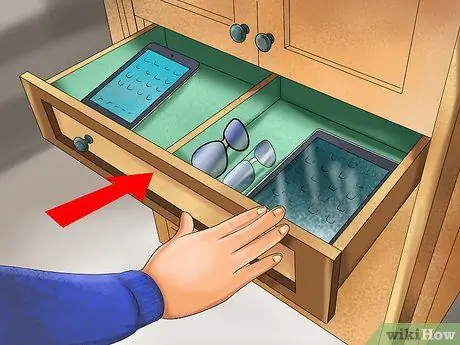
Step 4. Avoid technology
If you want to be alone, you'll need to reduce your use of technology, such as cell phones and computers, significantly because technology allows you to connect with other people. However, it is not recommended that you stop using technology completely because in an emergency, you should be able to find help. Try avoiding technology a little bit each day. Set aside a few hours, and turn off your phone and laptop. Use this technology-free time to be alone and think.
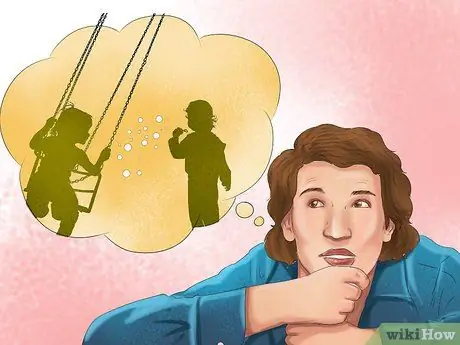
Step 5. Remember childhood
When you're alone for too long, you may think bad thoughts, so you may have a hard time doing them. Therefore, you should be able to calm yourself down. Because children often discover and solve new problems, they usually have better self-soothing skills than adults, and remembering your childhood can help you calm down as well.
- Try to remember how you calmed yourself down as a child. Simple rituals such as daydreaming can help you calm down while spending time alone.
- If your childhood was happy, you may be better able to calm yourself down. When your basic needs are met as a child, you will see the world as a safe and trustworthy place. However, if these needs are not met in the past, you will feel that the world is an insecure place. You may also need someone else's help to calm down.
- If your childhood was unstable, consider seeing a psychiatrist to help calm down. You'll have a hard time being alone if you can't calm yourself down.
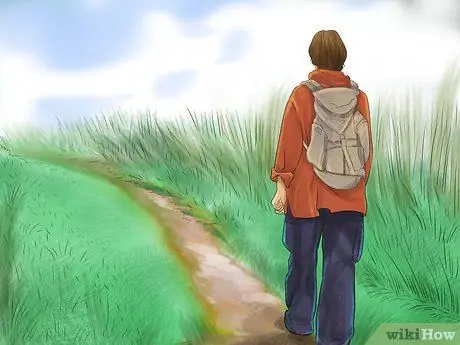
Step 6. Spend some time outdoors
Many ascetics love nature. Nature provides plenty of room for solitary thinking. Plus, without the distractions of technology, you'll be able to love solitude more.
- Many people like to camp or hike the mountains on their own. If you are experienced enough and understand the safety rules, try doing this activity alone.
- However, if you are not very experienced, camping alone can be a dangerous activity. Instead, try taking a walk alone in a forest park. If you live in a village, you may be able to enjoy nature just by sitting in the garden behind your house.
Method 2 of 3: Survival Alone
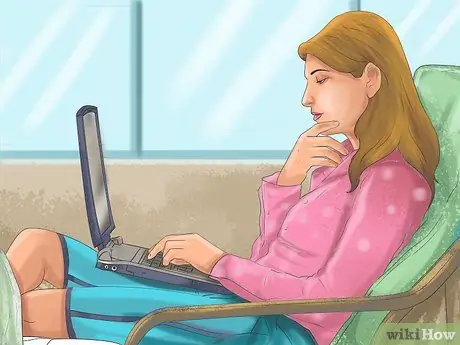
Step 1. Find work to do at home
If you want to be alone, you probably don't want to leave the house. With technology, you can find many jobs that you can do from home, with just a computer and an internet connection.
- Freelance writers generally work from home. You can also find other jobs, such as transcription writer or web developer, that you can do from home. In addition, most customer service jobs can be done in-house. You can be on the customer service team and take calls from home.
- If you have certain abilities, consider working on your own. You don't have to be entrepreneurial; You just need to work to meet the needs of clients from home. For example, you can become a freelance editor if you are a Literature graduate.

Step 2. Find a new way of shopping
If you really want to be alone, you may not want to leave the house even to buy necessities of life, such as clothes and groceries. Therefore, try to find new ways to shop.
- These days, you can order anything from the internet. Find online stores that sell your personal needs, such as books, clothes, food, and more. You may be surprised when you see the shipping costs, but if you calculate it, the shipping costs are the same as the cost of gasoline or transportation costs. Plus, you don't have to leave your house to shop.
- If you don't want to shop online, try avoiding people in other ways. For example, shop when the store is empty. Buy clothes during the day on weekdays. Since other people generally work, you probably won't meet as many people.

Step 3. Keep in touch with some people
If you want to be alone, you may feel the need to avoid people completely. However, this thinking is wrong. If you completely avoid people, you will not be able to survive.
- A strong relationship will make you feel more comfortable being alone. Even if you like being alone, it's a good idea to have someone you can rely on. Everyone needs support. In the event of an accident, you should at least rely on someone for help.
- Before being alone, try to deepen the relationship that has been established. Spend more time with friends and family. Reveal your deepest secrets with your closest friends. If you have several friends, you will be more comfortable being alone because you know that being alone is a choice, not a necessity.
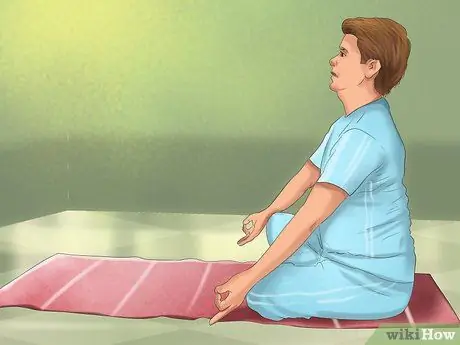
Step 4. Deal with stress
When spending time alone, you need to be able to deal with stress. You may have a harder time avoiding bad thoughts when you're alone.
- As explained in the previous step, you need to have a friend you can turn to when you're feeling stressed. You don't need to call your friends often, but having reliable friends is very important.
- Do activities that reduce stress, such as deep breathing, meditation, or yoga.
- Exercise regularly. Set aside at least 150 minutes per week for moderate aerobics, or 75 minutes a week for vigorous aerobics. With regular exercise, you will be better able to deal with negative emotions.
Method 3 of 3: Avoiding Bad Circumstances
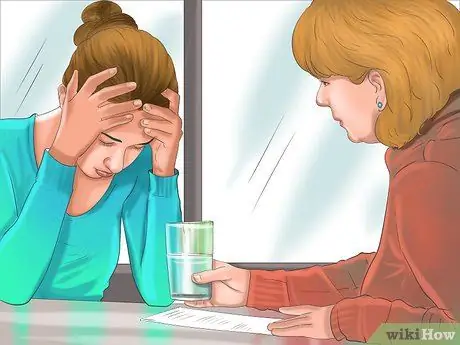
Step 1. Consider mental health conditions
Being alone is beneficial, but the desire to avoid social relationships can be a symptom of mental illness. Avoiding other people can increase feelings of depression, anxiety, and isolation. If you often feel sad, anxious, or unhappy, see a psychiatrist.
- Ask for a referral to a psychiatrist from your regular doctor, or through an insurance company.
- Use the free counseling facilities provided by the campus if you are a student.

Step 2. Avoid consuming things that are not important
This is usually done when alone. When you're not socializing, you may overeat, watch TV, or play games. By spending time unproductively, you cannot benefit from being alone. For example, while playing a game, you will certainly not think about the realities of life. Try to control food consumption and entertainment.
- Make a schedule for yourself. For example, you could try to go to bed at the same time each day, or limit the time you play games.
- If you have trouble controlling your food intake, try keeping track of the calories you consume. Record meal times, and the type of food eaten. If you gain weight, reduce your calorie intake.
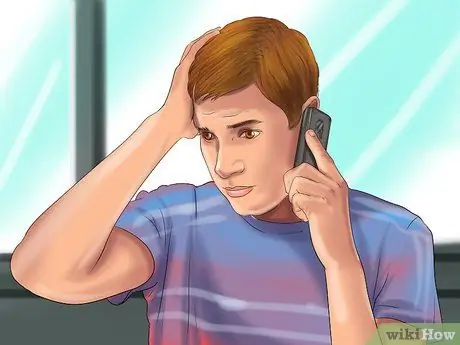
Step 3. Ask for help if needed
When you are alone, you may be forced to face harsh realities, or scary aspects of life. Therefore, ask for help when needed. If you're tired of being alone, call friends or family. Being alone is helpful, but sometimes you need help. When you need it, don't be afraid to ask.






